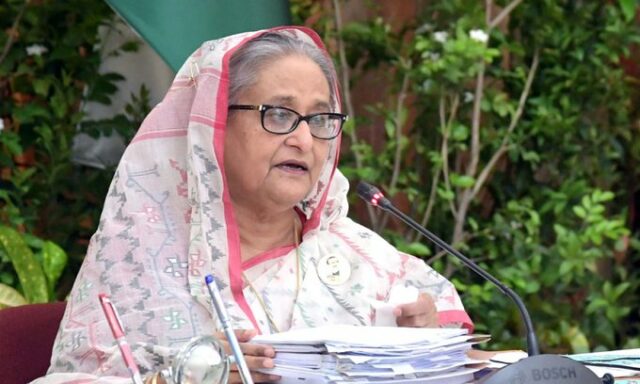
“Rehana and I survived just 20-25 minutes apart, we escaped death.”
That was Bangladesh’s ousted prime minister Sheikh Hasina, in a dramatic audio message posted on her party, the Awami League’s Facebook page.
“I feel it is the will of Allah that I have survived, the August 21 (2004) grenade attack, or surviving the huge bomb in Kotalipara (2000), surviving this time August 5, 2024, there must be a will of Allah, a hand of Allah although I am suffering, I am without my country, without my home, everything has been burned,” she said.
Hasina was also targeted in August 2004 when grenades were thrown during an anti-terrorism rally in Dhaka. Hundreds were injured by shrapnel and 24 died.
She was defiant in the face of the Bangladesh interim government demanding that India extradite her, so she could be tried for various crimes. She alleged a coordinated conspiracy to eliminate her.
“I believe Allah’s mercy has kept me alive for a reason,” went the audio message.
The Bangladesh International Crimes Tribunal has also issued an arrest warrant for her. But India is unlikely to send her back. She is seen as a key ally who not only kept the forces of terrorism and extremism at bay, but also worked with India to bring growth and livelihood to her people.
Hasina’s departure for India was abrupt, sudden. She was given less than an hour to pack and leave as mobs took to the streets demanding her resignation. With the army chief indicating his men had been ordered not to fire on the protesting students, Hasina had little choice.
She fled her official residence Ganobhaban minutes before the mobs descended on it, sacking, looting and burning anything they could get their hands on.
Hasina was moved to a military base in Dhaka before being flown to Delhi in a Bangladesh Air Force plane.
Thirty eight years in journalism, widely travelled, history buff with a preference for Old Monk Rum. Current interest/focus spans China, Technology and Trade. Recent reads: Steven Colls Directorate S and Alexander Frater's Chasing the Monsoon. Netflix/Prime video junkie. Loves animal videos on Facebook. Reluctant tweeter.




